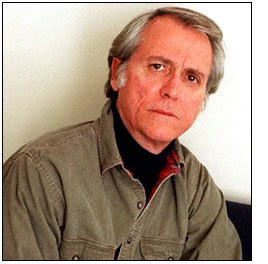
Reviews of Don DeLillo's new novel, Falling Man:
New York Times
Literary Review
Newsweek
New York Sun
Guardian Unlimited
Kirkus Reviews
###
The Don DeLillo Society Website



 Lawrence Halprin, born in 1916 and presumably now 90, made his mark as a landscape and urbanscape architect, designing for such spaces as Ghirardelli Square in San Francisco. He is a traveler who records his observations visually and verbally in a pleasing combination. I first learned about him through his Notebooks: 1959-1971. Like many innovators, he is hard to categorize neatly. Best know for his urban designs, his notebooks demonstrate his interest in a variety of natural and manmade phenomena. His wife Anna is a dancer/choreographer, and he apparently has spent a lot of time exploring connections between his architectural perspectives and her craft. In my travels, I'd like to learn to slow down and take the time that it must require to do observational sketches and notations like this one from a town in Norway (click on it for a closeup):
Lawrence Halprin, born in 1916 and presumably now 90, made his mark as a landscape and urbanscape architect, designing for such spaces as Ghirardelli Square in San Francisco. He is a traveler who records his observations visually and verbally in a pleasing combination. I first learned about him through his Notebooks: 1959-1971. Like many innovators, he is hard to categorize neatly. Best know for his urban designs, his notebooks demonstrate his interest in a variety of natural and manmade phenomena. His wife Anna is a dancer/choreographer, and he apparently has spent a lot of time exploring connections between his architectural perspectives and her craft. In my travels, I'd like to learn to slow down and take the time that it must require to do observational sketches and notations like this one from a town in Norway (click on it for a closeup):
 I've been planning for our trip to Italy, which begins in a week, in various ways. I've made reservations for each night of our trip except the final few days in Rome. I figure we can take care of that when we get to Rome at first. I've also ordered train passes good for any 7 days of first class train travel in Italy. We get a slight break for traveling together. Cost: about $300 each. Also, I've been reading the guidebooks, esp. Lonely Planet. And I've been boning up on Italian history--now, Robert Payne's Horizon Guide to Ancient Rome.
I've been planning for our trip to Italy, which begins in a week, in various ways. I've made reservations for each night of our trip except the final few days in Rome. I figure we can take care of that when we get to Rome at first. I've also ordered train passes good for any 7 days of first class train travel in Italy. We get a slight break for traveling together. Cost: about $300 each. Also, I've been reading the guidebooks, esp. Lonely Planet. And I've been boning up on Italian history--now, Robert Payne's Horizon Guide to Ancient Rome.I thought, on the way back, of the qualities of this very Italian place: the incongruous mixture of tolerance, naivete, overcrowding, sociability, family solidarity, localism, acceptance of modernism in its most hideous forms and yet with some sort of an inner self-defense against it--life led, in short, in the small dimension, full of pettiness, no doubt, and not without its small cruelties and injustices, but borne along by the broad, wise, disillusioned charity of the Catholic Church, by the comforting familiarities of family life, and by the unvarying, reassuring support of the Christian sacraments. (327)
I took another long walk this morning, only to hear a German military band playing on a square to a sizable audience of placid, politely applauding Dutchmen, and to see a place, only a block or two from the legation, where bombs had wiped out most of the inside of a city block.When you read Kennan, you know he's a thoughtful traveler, not just a close observer, but also a ponderer, a thinker about what he sees. It's the attitude I'd like to bring to my own travels.